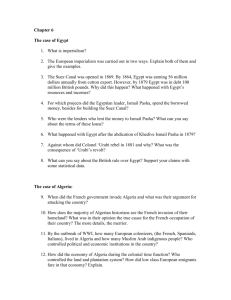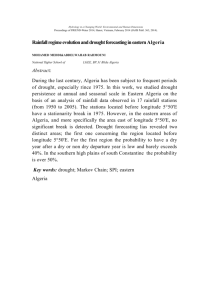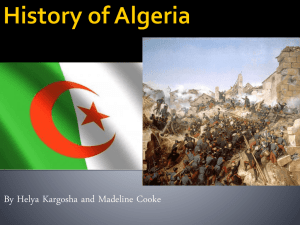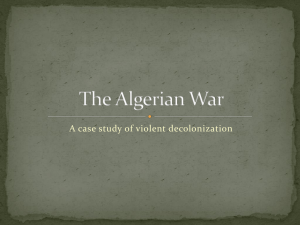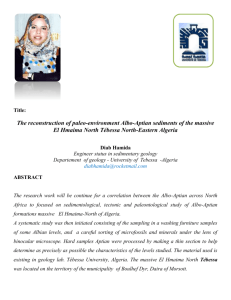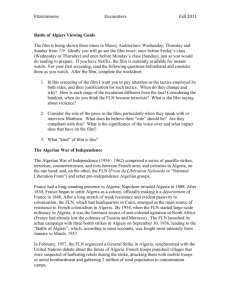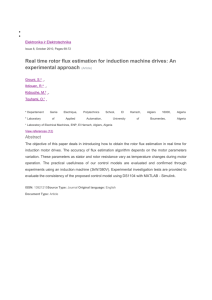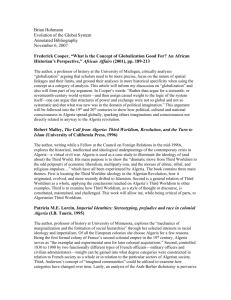Algeria - OpenNet Initiative
advertisement
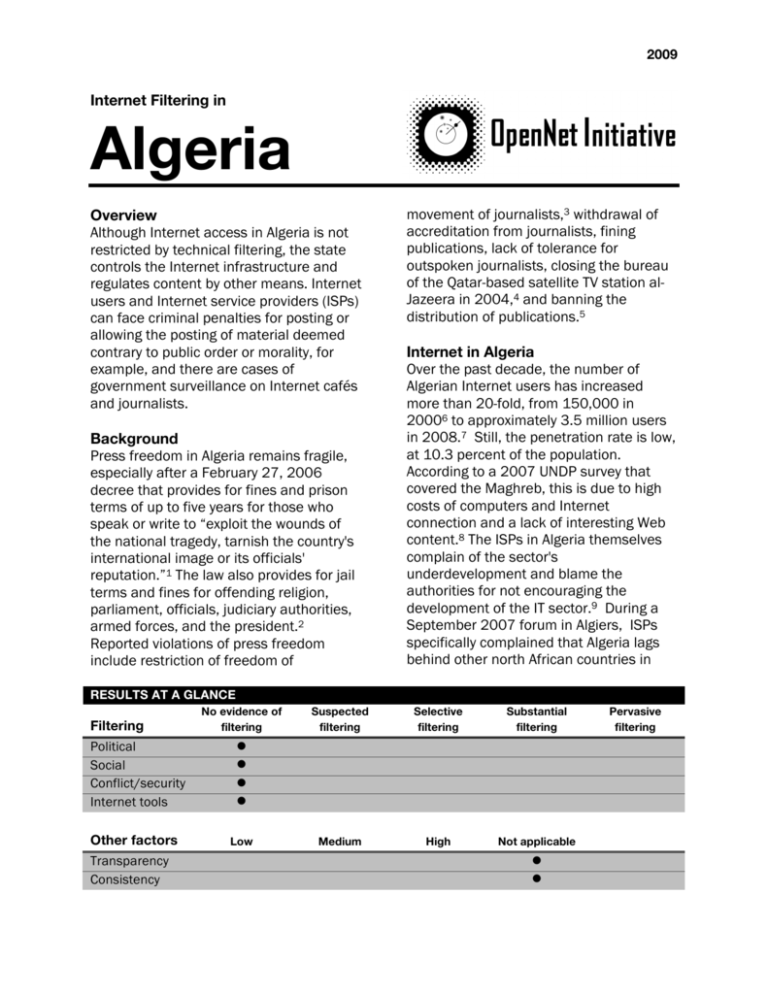
2009 Internet Filtering in Algeria Overview Although Internet access in Algeria is not restricted by technical filtering, the state controls the Internet infrastructure and regulates content by other means. Internet users and Internet service providers (ISPs) can face criminal penalties for posting or allowing the posting of material deemed contrary to public order or morality, for example, and there are cases of government surveillance on Internet cafés and journalists. Background Press freedom in Algeria remains fragile, especially after a February 27, 2006 decree that provides for fines and prison terms of up to five years for those who speak or write to “exploit the wounds of the national tragedy, tarnish the country's international image or its officials' reputation.”1 The law also provides for jail terms and fines for offending religion, parliament, officials, judiciary authorities, armed forces, and the president.2 Reported violations of press freedom include restriction of freedom of movement of journalists,3 withdrawal of accreditation from journalists, fining publications, lack of tolerance for outspoken journalists, closing the bureau of the Qatar-based satellite TV station alJazeera in 2004,4 and banning the distribution of publications.5 Internet in Algeria Over the past decade, the number of Algerian Internet users has increased more than 20-fold, from 150,000 in 20006 to approximately 3.5 million users in 2008.7 Still, the penetration rate is low, at 10.3 percent of the population. According to a 2007 UNDP survey that covered the Maghreb, this is due to high costs of computers and Internet connection and a lack of interesting Web content.8 The ISPs in Algeria themselves complain of the sector's underdevelopment and blame the authorities for not encouraging the development of the IT sector.9 During a September 2007 forum in Algiers, ISPs specifically complained that Algeria lags behind other north African countries in RESULTS AT A GLANCE Filtering Political Social Conflict/security Internet tools Other factors Transparency Consistency No evidence of filtering Suspected filtering Selective filtering Substantial filtering Pervasive filtering Low Medium High Not applicable 2009 KEY INDICATORS worst best GNI per capita, PPP (current international $)……………………......7,062 … .. Life expectancy at birth (years)……………………………………………….71.7 … Literacy rate (% of people age 15+)…………………………………………69.9 …………………… … … …… Human development index (out of 177)………………………………..…104 … Rule of law (percentile)……………………………………………………………..26 … Voice and accountability (percentile)……………………………………….…20 ……… Digital opportunity index (out of 181)……..………………………………….83 . Internet users (% of population)…………………….………………........10.34 terms of the number of domain names registered (at the time Algeria had 5,000, compared to Tunisia’s 16,000), that ASDL subscription is low, and that many state institutions do not have Web sites.10 To improve the ICT penetration rate, the government has started a number of initiatives, including its approval in January 2008 of an EUR100 million plan to implement Internet networks in every high school in the country.11 Algeria’s main operator of Internet services and fixed and mobile telephone services, Algerie Telecom, has been slated for privatization, but the process has been repeatedly delayed. The firm’s chief executive said in 2008 that the company will be ready for privatization by 2011.12 The number of Internet cafés in Algeria has jumped from 100 in 2000 to more than 5,000 in 2008.13 Many users reportedly frequent these cafés to view pornography, and as a result, a womenonly Internet café opened in March 2008 to accommodate conservative female Internet users.14 Chatting and searching for job opportunities online are among the popular activities in Internet cafés.15 … … . … the International Federation of Journalists (IFJ) and Reporters Without Borders (RSF). However, both IFJ and RSF demanded longer term reforms to protect press freedom, including abolishing the country's criminal defamation laws which, in addition to government dominance over broadcasting, economic constraints, and journalists' lack of access to official information, restrict freedom of expression in Algeria.16 In addition, in January 2008 the government reinforced its surveillance of the press by placing state-owned printing companies, which print half of Algeria’s privately-owned newspapers, under direct government control.17 Algerian authorities continue to ignore journalists’ repeated calls for revision of the press law to eliminate prison sentences for press offenses.18 Blogger Abd el Salam Baroudy, administrator of the Bilad Telmesan blog (http://bilad13.maktoobblog.com), was charged with criminal defamation for criticizing a government official on his blog in June 2007.19 In May 2008 the government introduced a new cybercrime bill amid reports that government Web sites receive about 4,000 hacking attempts per month and that Web sites of financial institutions are also targeted by hackers. The bill criminalized online activities such as hacking, stealing of personal data, Legal and regulatory frameworks In July 2006, Algerian President Abdelaziz Bouteflika pardoned all journalists convicted of defamation offences, a move welcomed by local journalists and by both 2 2009 promoting terrorism and crimes online, blackmailing, and copyright infringement.20 The bill was followed in May 2009 by the creation of a new national security service focused on cybercrime; police officers were also given explicit permission to “break into, inspect and control” Internet cafés in the interest of preventing terrorist activities.21 In 2005 the Algerian Government began allowing ISPs to use VoIP for international calls.22 State-own telecoms company Algeria Telecom Satellite (ATS) launched VoIP and GPS in September 2008.23 ONI testing results ONI testing found no evidence that the government filters Internet sites. However, the Algerian security forces blocked access to the Web site of the al-Qaeda Organization in the Islamic Maghreb in October 2007 after reports that the organization used the Web site to recruit minors and teenagers and to publish its press releases and videos related to terror attacks in Algeria.31 The government’s primary forms of control appear to be the access controls and content monitoring regulations noted above. Surveillance Article 14 of ministerial decree no 98-257 of August 25, 199824 makes ISPs responsible for the sites they host, and requires them to take “all necessary steps to ensure constant surveillance” of content to prevent access to “material contrary to public order and morality.” 25 In 2004, journalists reported that it could take up to two days to receive their emails; they believe the government is spying on them.26 Algerian security forces started raiding Internet cafés and checking the browsing history of Internet users after terrorist attacks hit the country in April 2007.27 In April 2008, the security forces increased their monitoring and surveillance efforts in Internet cafés to stop the use of these cafés for terrorist activities. 28 In addition, Internet cafés are required to collect names and ID numbers of their customers and report this information together with any suspicious activities to the police.29 In March 2008, the Algerian government ordered domestic mobile phone companies to stop selling anonymous mobile phones and SIM cards. This call was prompted by concerns that mobile phones were used in terrorist attacks in the country.30 Conclusion Although Algeria does not at present filter Internet content, legislation that criminalizes peaceful criticism of the government and requires ISPs to police online content, together with a highly centralized network, could facilitate the filtering of online content in the future. 3 2009 9 Lyes Aflou, “Algerian Internet service providers complain of sector's underdevelopment,” Magharebia, September 26, 2007, http://www.magharebia.com/cocoon/awi/x html1/en_GB/features/awi/features/2007/ 09/26/feature-02. 10 Ibid. 11 “Thalatha wa thamnoon fi almia min talameedh althanawiya la yastamiloon alinternet fi mo’asasatihim” (Arabic), Elkhabar, August 19, 2008, http://www.elkhabar.com/quotidien/?ida=1 19802&idc=36. 12 “Algeria Delays Algerie Telecom Privatization To 2011,” Zawya Dow Jones, October 15, 2008, https://www.zawya.com/story.cfm/sidZW20 081015000019/Algeria%20Delays%20Alge rie%20Telecom%20Privatization%20To%20 2011%20-%20Report. 13 Abdulrahman Abu Romi, “al-Fath: Awal maqha Internet nisaee biljazaer” (Arabic), Islamonline.net, March 16, 2008, http://www.islamonline.net/servlet/Satellite ?c=ArticleA_C&cid=1203758078732&page name=Zone-Arabic-News%2FNWALayout. 14 Ibid. 15Abdulrahman Abo Romi, “al-Jazaer: magahi alinternet maladh lilshabab ‘al-shomarah’” (Arabic), Islamonline.net, July 10, 2007, http://www.islamonline.net/servlet/Satellite ?c=ArticleA_C&cid=1183484144692&page name=Zone-Arabic-News%2FNWALayout. 16 International Freedom of Expression eXchange, “Journalists pardoned; President urged to reform defamation laws,” July 12, 2006, http://www.ifex.org/en/content/view/full/7 5619/. 17 Reporters Without Borders (RSF), “Government takes direct control of six state printers,” January 7, 2008, http://www.ifex.org/en/content/view/full/8 9415/. 18 Reporters Without Borders (RSF), “Algeria Annual report 2008,” http://www.rsf.org/article.php3?id_article= 25428. NOTES 1 International Federation of Journalists (IFJ), “CAPSULE REPORT: Press freedom still fragile; IFJ urges decriminalisation of press offences, release from prison of media employees,” June 9, 2008, http://www.ifex.org/en/content/view/full/9 4368/. 2 Ibid. 3 Observatory for the Freedom of Press, Publishing and Creation in Tunisia (OLPEC), “OLPEC's secretary-general turned back at Algerian border,” June 24, 2008, http://www.ifex.org/en/content/view/full/9 4764/. 4 Reporters Without Borders (RSF), “AFP bureau chief and Reuters correspondent have their accreditation withdrawn following alleged "defamation"; court fines "Liberté" publisher, editor and cartoonist,” June 17, 2008, http://www.ifex.org/en/content/view/full/9 4527/. 5 Reporters Without Borders (RSF), “Government bans issue of French weekly for publishing article on Kabylie region,” May 9, 2008, http://www.ifex.org/en/content/view/full/9 3588/. 6 International Telecommunications Union, “ITU Internet Indicators 2000,” http://www.itu.int/ITUD/icteye/Reporting/ShowReportFrame.aspx ?ReportName=/WTI/InformationTechnology Public&RP_intYear=2000&RP_intLanguageI D=1. 7 International Telecommunications Union, “ITU Internet Indicators 2008,” http://www.itu.int/ITUD/icteye/Reporting/ShowReportFrame.aspx ?ReportName=/WTI/InformationTechnology Public&RP_intYear=2008&RP_intLanguageI D=1. 8 Jamel Arfaoui, “Internet chat rooms offer romance to Maghreb residents,” Magharebia, August 1, 2008 http://www.magharebia.com/cocoon/awi/x html1/en_GB/features/awi/reportage/200 8/08/01/reportage-01. 4 2009 19 Arabic Network for Human Rights Information (HRinfo), “Blogger charged with criminal defamation for criticising official,” June 13, 2007, http://www.ifex.org/en/content/view/full/8 4108/. 20 “A new anti cyber-criminality bill to be examined by the Government,” El Khabar, September 9, 2008, http://www.elkhabar.com/FrEn/?ida=1223 13&idc=114. 21 Delila Henache and M.Moslem, “Government approved new procedure to combat cyber crime in Algeria,” Echorouk, May 10, 2009, http://www.echoroukonline.com/eng/index. php?news=6353. 22 “Algerian Government Spearheading Modernization of Information Technology Sector,” Magharebia, April 27, 2005, http://www.magharebia.com/cocoon/awi/x html1/en_GB/features/awi/newsbriefs/scie nce-tech/2005/04/27/newsbrief-02. 23 Nazim Fethi, “Algeria Telecom subsidiary unveils new GPS, VoIP services,” Magharebia, September 4, 2008, http://www.magharebia.com/cocoon/awi/x html1/en_GB/features/awi/features/2008/ 08/04/feature-03. 24 “Communications Industry Regulation in Algeria,” Mbendi Information Services, http://www.mbendi.com/indy/cotl/govc/af/ al/p0005.htm. 25 Reporters Without Borders (RSF), “Internet Under Surveillance 2004 - Algeria,” http://www.rsf.org/article.php3?id_article= 10730. 26 Ibid. 27 Fathiya Borowinah, “al-Jazaer: Ajhizat alamn tolin al-harb ala magahi alinternet liihbat masharee’ khalaya irhabiya naemah” (Arabic), Al-Riyadh, May 1, 2007, http://www.alriyadh.com/2007/05/01/arti cle246175.html. 28 Kamal al-shirazi, “Tawari fi aljazeaer dhid magahi alinternet,” Elaph.com, April 1, 2008, http://www.elaph.com/ElaphWeb/Politics/2 008/3/317444.htm. 29 Ibid. 30 Mohand Ouali, “Algeria tightens mobile telephone security,” Magharebia, March 2, 2008, http://www.magharebia.com/cocoon/awi/x html1/en_GB/features/awi/features/2008/ 03/02/feature-01. 31 Magharebia, “Algeria blocks access to alQaeda's Maghreb website,” October 18, 2007, http://www.magharebia.com/cocoon/awi/x html1/en_GB/features/awi/newsbriefs/gen eral/2007/10/18/newsbrief-01. 5


